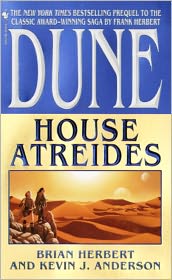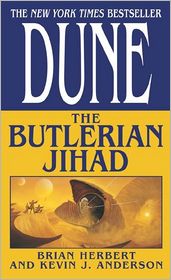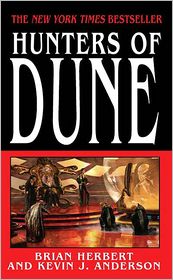Dune at 50: Great Prequels and Sequels That Expand Dune’s Universe
 Frank Herbert’s Dune casts a long shadow over the genre, one no author has had a more difficult time emerging from than his son, Brian Herbert. In 1999, Brian launched a new series of Dune books with co-author Kevin J. Anderson. More than a dozen prequels and sequels have since been released, with more on the way. They have sold very well, proving that fans are still eager for a return to Frank Herbert’s fascinating universe, but they’ve also suffered some unfair (if perhaps understandable) comparisons to the originals. Following up on a classic is always going to be a tall order.
Frank Herbert’s Dune casts a long shadow over the genre, one no author has had a more difficult time emerging from than his son, Brian Herbert. In 1999, Brian launched a new series of Dune books with co-author Kevin J. Anderson. More than a dozen prequels and sequels have since been released, with more on the way. They have sold very well, proving that fans are still eager for a return to Frank Herbert’s fascinating universe, but they’ve also suffered some unfair (if perhaps understandable) comparisons to the originals. Following up on a classic is always going to be a tall order.
If you ask me, Dune fans who dismiss the newer books are doing them a disservice. Several of the Brian/Kevin novels stand well on their own, especially if you can step back and appreciate them outside of the shadow of Dune.
Dune: House Atreides (Prelude to Dune Series #1)
Dune: House Atreides (Prelude to Dune Series #1)
In Stock Online
eBook $8.99
Building the backstory: Legends of Dune
The Brian/Kevin books take place before, during, and after the original series, beefing up characters and plotlines that weren’t touched upon in Dune and its sequels. The first new trilogy kicked off with Dune: House Atreides in 1999, covering events that transpired 35 years before Paul’s encounter with the Gom Jabbar. It fills in bits about Paul’s life on Caladan, the evil Baron Harkonnen’s rise to power, and even Pardot Kynes’ early days on Arrakis. The plot’s proximity to the events of Dune make it a tantalizing read, even if it is loses some of Frank Herbert’s thematic complexity.
The second trilogy takes a grand step back in time to deal with material that previously only existed as whispered tales. The Legends of Dune trilogy is set 10,000 years before Dune and establishes a new roster of characters, locations, and events. Ever wondered about the scientist who invented Holtzman engines or the thinking machine uprising that underscored computer paranoia in Dune? Grab The Butlerian Jihad and hold on tight.
Building the backstory: Legends of Dune
The Brian/Kevin books take place before, during, and after the original series, beefing up characters and plotlines that weren’t touched upon in Dune and its sequels. The first new trilogy kicked off with Dune: House Atreides in 1999, covering events that transpired 35 years before Paul’s encounter with the Gom Jabbar. It fills in bits about Paul’s life on Caladan, the evil Baron Harkonnen’s rise to power, and even Pardot Kynes’ early days on Arrakis. The plot’s proximity to the events of Dune make it a tantalizing read, even if it is loses some of Frank Herbert’s thematic complexity.
The second trilogy takes a grand step back in time to deal with material that previously only existed as whispered tales. The Legends of Dune trilogy is set 10,000 years before Dune and establishes a new roster of characters, locations, and events. Ever wondered about the scientist who invented Holtzman engines or the thinking machine uprising that underscored computer paranoia in Dune? Grab The Butlerian Jihad and hold on tight.
Dune: The Butlerian Jihad (Legends of Dune Series #1)
Dune: The Butlerian Jihad (Legends of Dune Series #1)
By Brian Herbert , Kevin J. Anderson
In Stock Online
eBook $9.99
One of the biggest strengths of the Legends trilogy is that it doesn’t take place inside of the original series. It’s set far enough back that it doesn’t invite direct comparisons to the elder Herbert’s work, giving it a little breathing room. Change over long periods of time is one of the most intriguing themes of Dune, and this distant prequel does a good job setting the stage for a play that’s already taken place. The events of the jihad directly shape the Dune universe. Getting a little insight, even if it’s not from Frank Herbert’s own typewriter, enriches every novel and short story that follows.
The Butlerian Jihad, The Machine Crusade, and The Battle of Corrin are among the easiest prequel books to sit down with and enjoy. Even seasoned Dune fanatics will be able to forget their prejudices and tear through them. If you’re going to explore any of the new generation novels, make it these.
One of the biggest strengths of the Legends trilogy is that it doesn’t take place inside of the original series. It’s set far enough back that it doesn’t invite direct comparisons to the elder Herbert’s work, giving it a little breathing room. Change over long periods of time is one of the most intriguing themes of Dune, and this distant prequel does a good job setting the stage for a play that’s already taken place. The events of the jihad directly shape the Dune universe. Getting a little insight, even if it’s not from Frank Herbert’s own typewriter, enriches every novel and short story that follows.
The Butlerian Jihad, The Machine Crusade, and The Battle of Corrin are among the easiest prequel books to sit down with and enjoy. Even seasoned Dune fanatics will be able to forget their prejudices and tear through them. If you’re going to explore any of the new generation novels, make it these.
Hunters of Dune (Dune 7 Series #1)
Hunters of Dune (Dune 7 Series #1)
In Stock Online
Paperback $11.99
Continuing the saga
In the mid-2000s, the announcement that Brian and Kevin would write a sequel to the original Dune series caused an uproar. The ending of Chapterhouse Dune had generated heated discussion for decades, and it was common knowledge Frank Herbert had planned to write one final installment before his death in 1986. It seemed blasphemous to push forward, especially when the new guys had a writing style vastly different from the original author.
As it turns out, Frank Herbert left behind a wealth of notes about the Dune universe, including detailed plans for the seventh book. Brian and Kevin filled in the gaps and eventually expanded Dune 7 into two books: Hunters of Dune and Sandworms of Dune. The novels pick up characters and storylines from both the original Dune series and Legends of Dune, encapsulating all of Frank’s work in tidy sets of books that directly connect to one another.
On first pass, Hunters of Dune feels like an extended prologue to Sandworms of Dune, but once you complete the duology, you’ll realize the payoff was worth it. Loose ends that had been flapping in the wind for decades are neatly tied up, and details from the prequels are woven into a new, series-encompassing ending. The result is a brand new, stunningly epic, and surprisingly satisfying whole.
We’re celebrating the 50th anniversary of Dune throughout 2015. View the complete article series here.
Continuing the saga
In the mid-2000s, the announcement that Brian and Kevin would write a sequel to the original Dune series caused an uproar. The ending of Chapterhouse Dune had generated heated discussion for decades, and it was common knowledge Frank Herbert had planned to write one final installment before his death in 1986. It seemed blasphemous to push forward, especially when the new guys had a writing style vastly different from the original author.
As it turns out, Frank Herbert left behind a wealth of notes about the Dune universe, including detailed plans for the seventh book. Brian and Kevin filled in the gaps and eventually expanded Dune 7 into two books: Hunters of Dune and Sandworms of Dune. The novels pick up characters and storylines from both the original Dune series and Legends of Dune, encapsulating all of Frank’s work in tidy sets of books that directly connect to one another.
On first pass, Hunters of Dune feels like an extended prologue to Sandworms of Dune, but once you complete the duology, you’ll realize the payoff was worth it. Loose ends that had been flapping in the wind for decades are neatly tied up, and details from the prequels are woven into a new, series-encompassing ending. The result is a brand new, stunningly epic, and surprisingly satisfying whole.
We’re celebrating the 50th anniversary of Dune throughout 2015. View the complete article series here.


